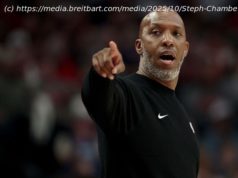For victims of alleged harassment or assault, the decision to come forward can be fraught and delicate _ even when the alleged perpetrator is not famous, like Harvey Weinstein.
Day by day, the accusations pile up, as scores of women come forward to say they were victims of Harvey Weinstein. But others with stories to tell have not.
For some of these women who’ve chosen not to go public, the fear of being associated forever with the sordid scandal — and the effects on their careers, and their lives — might be too great. And some still struggle with the lingering effects of their encounters with the mogul.
Canadian actress Erika Rosenbaum, 37, had just gone public with her own allegations of sexual misconduct by Weinstein when, about 10 days ago, she received a Facebook message from a young woman, asking if they could speak.
The aspiring filmmaker and actress had listened to Rosenbaum’s recorded interview with The New York Times, in which she described several disturbing incidents in hotel rooms with the producer some 15 years ago. And she wanted to tell Rosenbaum about her own, remarkably similar but much more recent experiences with Weinstein — a series of harrowing hotel-room encounters which, she alleges, took place just last year, when she was 21.
She told Rosenbaum she’d developed a relationship with Weinstein that was really two relationships: «One where he was very much a mentor… and another that I kept locked inside a secret compartment in my mind where he was manipulating me in a way that I didn’t know how I’d got there, or how to get out.»
She wanted Rosenbaum’s advice: Should she go public with her story? She wanted her story to serve as a warning to other young women, but was just beginning her career, and worried about being tainted by association with the scandal. And because the encounters were so recent, she was only beginning to process it all.
Rosenbaum told her that going public was a personal decision, not right for everyone. The young woman has decided that for now, she is not. «I’m not Gwyneth or Angelina or Lupita,» she says, referring to some famous women who have accused Weinstein. «I think I deserve to build my career without being linked to Harvey Weinstein every time somebody Googles my name.»
As any advocate for victims of sexual harassment or assault will tell you, the decision of whether to come forward can be an excruciating one. Though Weinstein’s rapid downfall — he was fired by his own company — likely lessens the fear of retaliation, there remains the fear of being stigmatized. Attorney Gloria Allred, who has presented four alleged Weinstein victims before the cameras, says she has spoken to more than that who are remaining anonymous.
«You can’t ever take it back,» says Jeanie Kurka Reimer, who’s spent 30 years working in the field of sexual assault in Wisconsin, as an advocate, therapist and consultant, of the decision to go public. «It’s a life-changing decision.»
Like Rosenbaum, the young woman, who told her story in multiple interviews with The Associated Press on condition of anonymity, met Weinstein at a party last year. They had three meetings where they simply discussed her film work.
But then, after an evening event with Weinstein and others, they ended up back at his hotel, she says. She assumed everyone was meeting for dinner. Suddenly, in a scenario that matches that of many accusers, Weinstein made a brief exit and returned naked, the woman alleges. He asked her to strip; she said no, repeatedly, but he kept negotiating. Eventually, the woman alleges, both were naked, and he convinced her to give him a massage and then lie on the bed as he masturbated.
Even before she left the room, she says she was blaming herself: «I put myself here, and now I have to clean up my mess.» But she hoped it was just a one-time thing, and wanted to preserve what she believed was a friendship.
More meetings followed. The woman says she refused to have intercourse with Weinstein, but that persisted in other ways, including pressuring her into oral sex, or standing her in front of a mirror while he pleasured himself.
Weinstein has repeatedly denied all allegations of non-consensual sex. His representatives did not respond to multiple requests for comment.
After nine months, the young woman finally told her parents. «You’re going to hate me,» she cried to her mother. Earlier this year, she ended the relationship, she says. The AP has seen written journal entries referring to Weinstein, and emails of a non-intimate nature; it has also spoken to family members and her manager.
Rosenbaum, too, was in her early 20s when she met Weinstein. She too ended up in a hotel room, where she alleges he coaxed her into a massage.
The next time Rosenbaum found herself in a hotel room with Weinstein, she alleges, he held her by the back of the neck in front of a mirror and masturbated.
«He didn’t have a gun to my head, he didn’t wrestle me to the floor,» Rosenbaum told the Times. «I just didn’t know how to get out.»
When the Weinstein story broke this month, Rosenbaum, who lives in Montreal, says she was able to come forward because she was in a different place than she was 15 years ago. «My life is full and balanced in a way it wasn’t when I was young,» she says. «I see the long game now. That balance gave me the ability to be honest.»
Sign up today for unlimited digital access to our website, apps, the digital newspaper and more.






